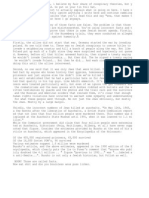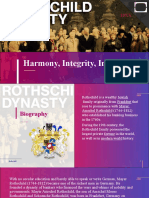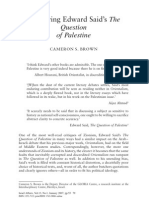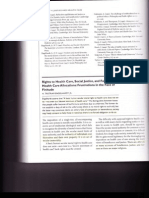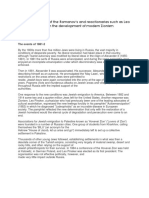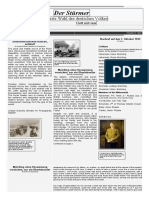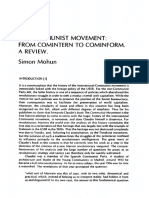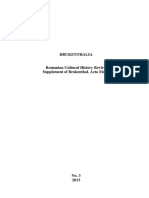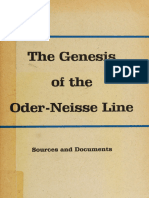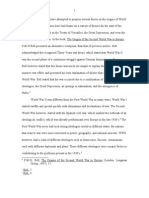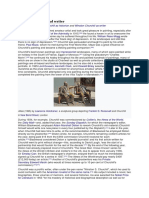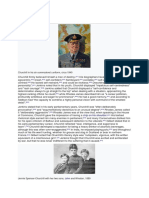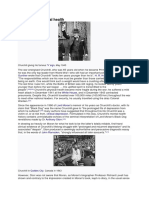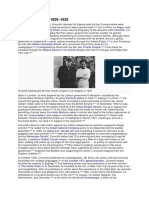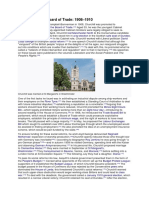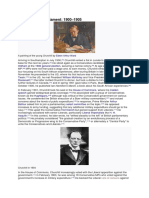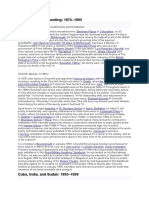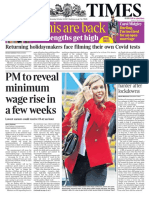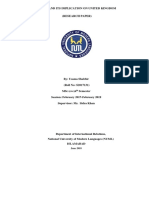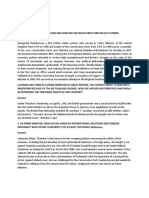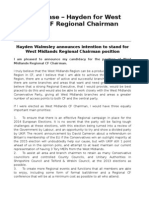Sir Winston Churchill - Imperialism
Sir Winston Churchill - Imperialism
Uploaded by
Sachie1912Copyright:
Available Formats
Sir Winston Churchill - Imperialism
Sir Winston Churchill - Imperialism
Uploaded by
Sachie1912Original Description:
Copyright
Available Formats
Share this document
Did you find this document useful?
Is this content inappropriate?
Report this DocumentCopyright:
Available Formats
Sir Winston Churchill - Imperialism
Sir Winston Churchill - Imperialism
Uploaded by
Sachie1912Copyright:
Available Formats
Imperialism
British Empire at its territorial peak in 1921
Churchill was an imperialist,[600] with the historian Edward Adams characterising him as an
adherent of "liberal imperialism".[601] Churchill exhibited a romanticised view of the British
Empire,[602] and believed British imperialism was a form of altruism that benefitted its subject
peoples; early in his parliamentary career he expressed concern for the welfare of various
African groups.[603] According to Addison, Churchill believed "that by conquering and dominating
other peoples, the British were also elevating and protecting them", holding to the conviction that
"civilization must necessarily triumph over barbarism, however tragic the process" of conquest
might be for the conquered.[604] According to Adams, Churchill's writings display a "cavalier tone
and militarist ideology" in defence of "imperial war".[601] The idea of dismantling the Empire by
transferring power to subject peoples was anathema to Churchill.[605]
Churchill with Princess Elizabeth in 1950
During Churchill's lifetime, belief in the racial superiority of the British was widespread, including
among liberals and socialists, and Churchill also subscribed to such ideas.[606] In 1952 he told
Lord Moran that "When you learn to think of a race as inferior beings it is difficult to get rid of that
way of thinking; when I was a subaltern in India the Indians did not seem to be equal to the white
man."[607] However, noting that "Churchill had no theory of race as a biological entity", Addison
considered it misleading to describe Churchill as a racialist, arguing that that term "has many
connotations which were alien to Churchill."[606] He believed that Churchill would have never tried
"to stoke up racial animosity against immigrants, or to persecute minorities".[606] Churchill opposed
anti-Semitism,[606] and was well disposed to Zionism throughout his career:[608] in 1920, he called it
an "inspiring movement".[609]
Although Churchill upset both Edward VII and George V during his political career, he was a
firm monarchist,[610] displaying a romanticised view of the British monarchy.[602] Jenkins described
Churchill's opposition to protectionism as being based on a "profound conviction",[611] although
during his political career many questioned the sincerity of Churchill's anti-protectionist
beliefs.[612] Although as Home Secretary he found sanctioning executions to be one of his most
emotionally taxing tasks, he did not endorse the abolition of the death penalty.[613] Around 1912
he became briefly enthusiastic regarding the eugenicist idea of sterilising the disabled, but it was
not a recurring interest of his.[606]
Links to political parties
James described Churchill as having "no permanent commitment to any" party, and that his
"shifts of allegiance were never unconnected with his personal interests".[614] When campaigning
for his Oldham seat in 1899, Churchill referred to himself as a Conservative and a Tory
Democrat;[615] the following year, he referred to Liberals as "prigs, prudes, and faddists".[612] In a
1902 letter to a fellow Conservative, Churchill stated that he had "broad, tolerant, moderate
views—a longing for compromise and agreement—a disdain for cant of all kinds—a hatred for
extremists whether they be Jingos or Pro-Boers; and I confess the idea of a central party,
fresher, freer, more efficient, yet, above all, loyal and patriotic, is very pleasing to my
heart."[616] This dream of a "Centre Party" uniting moderate elements of the main British parties—
and thus remaining permanently in office—was a recurring one for Churchill.[617] In 1924, with
Labour supplanting the Liberals as the Conservatives' main rival, Churchill contemplated forming
a new party called the "Liberal-Conservatives".[618]
By 1903, he was increasingly dissatisfied with the Conservatives, in part due to their promotion of
economic protectionism, but also because he had attracted the animosity of many party
members and was likely aware that this might have prevented him gaining a Cabinet position
under a Conservative government. The Liberal Party was then attracting growing support, and so
his defection may have also have been influenced by personal ambition.[619] In a 1903 letter, he
referred to himself as an "English Liberal ... I hate the Tory party, their men, their words and their
methods".[620] Jenkins noted that, with Lloyd George, Churchill formed "a partnership of
constructive radicalism, two social reforming New Liberals who had turned their backs on the old
Gladstonian tradition of concentrating on libertarian political issues and leaving social conditions
to look after themselves".[148]
Throughout his political career, Churchill's relationship with the Conservative Party was
stormy;[592] Addison noted that his "loyalty [to the party] was never absolute".[583]
You might also like
- A Critical History of German Film. Second Edition (Stephen Brockmann) (Z-Library)Document690 pagesA Critical History of German Film. Second Edition (Stephen Brockmann) (Z-Library)wazahatrizvi1979Noch keine Bewertungen
- (Neuschwabenland Archiv) Chicago Tribune - Allied War Crimes in Germany-Chicago Tribune Press Service (1948) PDFDocument20 pages(Neuschwabenland Archiv) Chicago Tribune - Allied War Crimes in Germany-Chicago Tribune Press Service (1948) PDFAna CicadaNoch keine Bewertungen
- Friends of David Goldberg: Videos Playlists Community Channels AboutDocument1 pageFriends of David Goldberg: Videos Playlists Community Channels AboutantiantiantiproNoch keine Bewertungen
- America and The Memory of The Holocaust 1950-1965Document21 pagesAmerica and The Memory of The Holocaust 1950-1965Sanja HorvatinčićNoch keine Bewertungen
- Life Span of Prophet Muhammad (SAW) - TimelineDocument2 pagesLife Span of Prophet Muhammad (SAW) - TimelineRao AkifNoch keine Bewertungen
- BAUER - Rethinking The HolocaustDocument351 pagesBAUER - Rethinking The HolocaustFranBecher100% (1)
- Anti-Semitism and RacismDocument48 pagesAnti-Semitism and RacismartgrigleyNoch keine Bewertungen
- A Prisoner of The Reds-Francis McCullagh-1922-369pgs-POL - SMLDocument369 pagesA Prisoner of The Reds-Francis McCullagh-1922-369pgs-POL - SMLRobin TobarNoch keine Bewertungen
- Last Will and Testament - Adolf HitlerDocument1 pageLast Will and Testament - Adolf HitlerJoris YapNoch keine Bewertungen
- Anti New York Times - June 2016Document52 pagesAnti New York Times - June 2016madhusri002Noch keine Bewertungen
- Fucking Holocaust Deniers...Document1 pageFucking Holocaust Deniers...Sputnik LunchovitchNoch keine Bewertungen
- Iron GuardDocument9 pagesIron GuardAnonymous 3Y1ZnENoch keine Bewertungen
- Schwarz Dieter-Freemasonry, 1944Document70 pagesSchwarz Dieter-Freemasonry, 1944nicolasflo100% (1)
- Total Empire Edmund WalshDocument303 pagesTotal Empire Edmund Walshmarcos robertoNoch keine Bewertungen
- 200 Chomsky LiesDocument95 pages200 Chomsky Liesjjorge00100% (1)
- The Revisionist - Journal For Critical Historical Inquiry - Volume 2 - Number 1 (En, 2004, 122 S., Text)Document122 pagesThe Revisionist - Journal For Critical Historical Inquiry - Volume 2 - Number 1 (En, 2004, 122 S., Text)hjuinixNoch keine Bewertungen
- The Jewish Criticisim of Gentile CultureDocument64 pagesThe Jewish Criticisim of Gentile CulturexxxxdadadNoch keine Bewertungen
- TBR 2018 CatalogDocument24 pagesTBR 2018 CatalogEdwin Hardee TurlingtonNoch keine Bewertungen
- Harmony, Integrity, IndustryDocument6 pagesHarmony, Integrity, Industryjohn kevin pascuaNoch keine Bewertungen
- Zionist Attack On SaidDocument25 pagesZionist Attack On SaidSham ShamkarNoch keine Bewertungen
- The Oath To Adolf Hitler - Speech by Rudolf HessDocument3 pagesThe Oath To Adolf Hitler - Speech by Rudolf HessAnonNoch keine Bewertungen
- The Rule of Law (Tom Bingham) ExtDocument9 pagesThe Rule of Law (Tom Bingham) ExtarayaNoch keine Bewertungen
- Engelhardt BioethicsDocument9 pagesEngelhardt BioethicsAaron Lee WiegmannNoch keine Bewertungen
- Millions Cried... No One Listened 2012Document9 pagesMillions Cried... No One Listened 2012Victor Navarro ChNoch keine Bewertungen
- The Conditions That Enabled Dictators To Rise To Power in The Interwar PeriodDocument4 pagesThe Conditions That Enabled Dictators To Rise To Power in The Interwar PeriodAlark SharmaNoch keine Bewertungen
- Mhistory Moodle TaskDocument1 pageMhistory Moodle TaskJakeNoch keine Bewertungen
- Lenin On The Jewish QuestionDocument25 pagesLenin On The Jewish QuestionpikacellNoch keine Bewertungen
- Cabbala of Power (Israel Shamir)Document327 pagesCabbala of Power (Israel Shamir)Carlos Alberto Dalarmelino Jr.100% (1)
- The Depiction of Stalin Between History and MythologyDocument11 pagesThe Depiction of Stalin Between History and MythologyMrWaratahs100% (1)
- The Journal of Historical Review Volume 09-Number - 1-1989Document128 pagesThe Journal of Historical Review Volume 09-Number - 1-1989wahrheit88Noch keine Bewertungen
- Der SturmerDocument2 pagesDer Sturmerapi-552570985Noch keine Bewertungen
- Black Invention MythsDocument16 pagesBlack Invention MythsjoetylorNoch keine Bewertungen
- JournalDocument147 pagesJournalCfca AntisemitismNoch keine Bewertungen
- Psychoanalysis K - Wake 2017Document170 pagesPsychoanalysis K - Wake 2017EthanNoch keine Bewertungen
- Degrelle LВon - Hitler, Born at Versailles PDFDocument466 pagesDegrelle LВon - Hitler, Born at Versailles PDFDon_HardonNoch keine Bewertungen
- Understanding NSDocument17 pagesUnderstanding NSKazo NicolajNoch keine Bewertungen
- Rosenberg JacobDocument9 pagesRosenberg Jacobstrikes holo100% (1)
- Harvard - Adolf EichmannDocument13 pagesHarvard - Adolf EichmannJD MayweatherNoch keine Bewertungen
- The Lost Princess of RussiaDocument1 pageThe Lost Princess of RussiaPrincess Lucy HeartfilliaNoch keine Bewertungen
- Former Soviet Dissident Warns For EU DictatorshipDocument6 pagesFormer Soviet Dissident Warns For EU DictatorshipPhilip Andrews100% (1)
- The Communist Movement: From Comintern To Cominform - A Review - Simon MohunDocument15 pagesThe Communist Movement: From Comintern To Cominform - A Review - Simon MohunMarcelo Arrué AlvaradoNoch keine Bewertungen
- Changes in Our Struggle by Reinhard HeydrichDocument11 pagesChanges in Our Struggle by Reinhard HeydrichMichaelNoch keine Bewertungen
- Case Studies of Communist Conquest Plans and Occupations in The Third World During The Cold WarDocument36 pagesCase Studies of Communist Conquest Plans and Occupations in The Third World During The Cold WarNevin GussackNoch keine Bewertungen
- Occidental Observer - Art World Manipulated PT2Document6 pagesOccidental Observer - Art World Manipulated PT2D.ElderNoch keine Bewertungen
- H. Du B. Reports: Foreign Affairs LetterDocument60 pagesH. Du B. Reports: Foreign Affairs LetterHal ShurtleffNoch keine Bewertungen
- Brukenthalia 3 PDFDocument225 pagesBrukenthalia 3 PDFSabina Madgearu StanilaNoch keine Bewertungen
- Crainic in 1930s-Libre PDFDocument21 pagesCrainic in 1930s-Libre PDFMoga Alexandra-LoredanaNoch keine Bewertungen
- The Kaiser's JihadDocument3 pagesThe Kaiser's JihadTibor KrauszNoch keine Bewertungen
- The Genesis of The Order-Neisse Line - Gotthold Rhode and Wolfgang Wagner - 1959 - Brentano-Verlag - Anna's ArchiveDocument326 pagesThe Genesis of The Order-Neisse Line - Gotthold Rhode and Wolfgang Wagner - 1959 - Brentano-Verlag - Anna's ArchiveHugãoNoch keine Bewertungen
- Stalin OutlineDocument4 pagesStalin OutlineIoanna MantaNoch keine Bewertungen
- PMH Bell Thesis Essay - DraftDocument7 pagesPMH Bell Thesis Essay - DraftFadi DawoodNoch keine Bewertungen
- H 1984Document60 pagesH 1984Hal ShurtleffNoch keine Bewertungen
- US Islamic Groups Demand Islamophobia 'Purge' in Letter To White HouseDocument7 pagesUS Islamic Groups Demand Islamophobia 'Purge' in Letter To White HousePatrick PooleNoch keine Bewertungen
- CommunismDocument19 pagesCommunismsmitas2sharmaNoch keine Bewertungen
- The Muslim MafiaDocument3 pagesThe Muslim Mafiacharlene cleo eibenNoch keine Bewertungen
- Corneliu CodreanuDocument11 pagesCorneliu CodreanuwohawwwNoch keine Bewertungen
- Burmese CP in Relations Between China and Burma by Oliver HensengerthDocument42 pagesBurmese CP in Relations Between China and Burma by Oliver Hensengerthswapan55Noch keine Bewertungen
- Education: Key Questions To ConsiderDocument6 pagesEducation: Key Questions To Considerjkjahkjahd987981723Noch keine Bewertungen
- The Rise of The Nazi Party How Hitler Used The Power of Propaganda And Mass Communication to Rise to PowerFrom EverandThe Rise of The Nazi Party How Hitler Used The Power of Propaganda And Mass Communication to Rise to PowerNoch keine Bewertungen
- Napoleonic Wars - War of The Fifth CoalitionDocument4 pagesNapoleonic Wars - War of The Fifth CoalitionSachie1912Noch keine Bewertungen
- Napoleonic Wars - British MotivationDocument4 pagesNapoleonic Wars - British MotivationSachie1912Noch keine Bewertungen
- Napoleonic Wars - BackgroundDocument2 pagesNapoleonic Wars - BackgroundSachie1912Noch keine Bewertungen
- Sir Winston Churchill - Relations With The US and The Quest For A SummitDocument1 pageSir Winston Churchill - Relations With The US and The Quest For A SummitSachie1912Noch keine Bewertungen
- Sir Winston Churchill - FuneralDocument1 pageSir Winston Churchill - FuneralSachie1912Noch keine Bewertungen
- Sir Winston Churchill - Artist, Historian, and WriterDocument2 pagesSir Winston Churchill - Artist, Historian, and WriterSachie1912Noch keine Bewertungen
- Sir Winston Churchill - Personal LifeDocument3 pagesSir Winston Churchill - Personal LifeSachie1912Noch keine Bewertungen
- Sir Winston Churchill - Mental and Physical HealthDocument2 pagesSir Winston Churchill - Mental and Physical HealthSachie1912Noch keine Bewertungen
- Political Isolation - ChurchillDocument2 pagesPolitical Isolation - ChurchillSachie1912Noch keine Bewertungen
- Sir Winston Churchill - We Shall Never Surrender!Document2 pagesSir Winston Churchill - We Shall Never Surrender!Sachie1912Noch keine Bewertungen
- Sir Winston Churchill - Second Term As Prime MinisterDocument2 pagesSir Winston Churchill - Second Term As Prime MinisterSachie1912Noch keine Bewertungen
- We Shall Never Surrender - ChurchillDocument3 pagesWe Shall Never Surrender - ChurchillSachie1912Noch keine Bewertungen
- Mental and Physical Health - ChurchillDocument3 pagesMental and Physical Health - ChurchillSachie1912Noch keine Bewertungen
- Diplomas - Removed PiecesDocument5 pagesDiplomas - Removed PiecesSachie19120% (1)
- Home Secretary - ChurchillDocument2 pagesHome Secretary - ChurchillSachie1912Noch keine Bewertungen
- Bach Invention 13 A4 PDFDocument2 pagesBach Invention 13 A4 PDFSachie1912Noch keine Bewertungen
- President of The Board of Trade and Home Secretary - ChurchillDocument3 pagesPresident of The Board of Trade and Home Secretary - ChurchillSachie1912Noch keine Bewertungen
- Early Political Career - ChurchillDocument3 pagesEarly Political Career - ChurchillSachie1912Noch keine Bewertungen
- Childhood - ChurchillDocument2 pagesChildhood - ChurchillSachie1912Noch keine Bewertungen
- Brexit: All You Need To Know About The UK Leaving The EU: What Does Brexit Mean?Document18 pagesBrexit: All You Need To Know About The UK Leaving The EU: What Does Brexit Mean?saad aliNoch keine Bewertungen
- A Professional Historian in Private Practice'. Hugh Thomas: The Spanish Civil War and BeyondDocument21 pagesA Professional Historian in Private Practice'. Hugh Thomas: The Spanish Civil War and BeyondCristóbal PortalesNoch keine Bewertungen
- Dharmic Ideas Ge2015 ReportDocument27 pagesDharmic Ideas Ge2015 ReportAditya Vardhan MadabhushaniNoch keine Bewertungen
- Name: Erika Tiban DATE: Friday, February 26, 2021 NRC: 3270 Politics and YouthDocument4 pagesName: Erika Tiban DATE: Friday, February 26, 2021 NRC: 3270 Politics and YouthERIKA ANABELL TIBAN CHIMBONoch keine Bewertungen
- Rishi Sunak Becomes Third British Prime Minister of The YearDocument6 pagesRishi Sunak Becomes Third British Prime Minister of The YearSaumya JoshiNoch keine Bewertungen
- The - Times (2021 10 06)Document68 pagesThe - Times (2021 10 06)Fadilah AnsariNoch keine Bewertungen
- College Essays SamplesDocument7 pagesCollege Essays Samplesxqqryvwhd100% (2)
- Brexit FinalDocument24 pagesBrexit FinalDaniyal Hsteg100% (1)
- Upp-Int Progress Test Unit 04 ADocument5 pagesUpp-Int Progress Test Unit 04 AДіма Чихайда0% (1)
- Tema 63 Febrero 2021Document13 pagesTema 63 Febrero 2021ismael palmaNoch keine Bewertungen
- GQ British - February 2014 UKDocument254 pagesGQ British - February 2014 UKabiesaga90Noch keine Bewertungen
- EU Roots and British Accession (1957-1973) : Commented (P1) : Sairia Logo em 1992Document6 pagesEU Roots and British Accession (1957-1973) : Commented (P1) : Sairia Logo em 1992matheusxavier90Noch keine Bewertungen
- Bread For All - Chris RenwickDocument141 pagesBread For All - Chris RenwickPepe Hernández.Noch keine Bewertungen
- BachoDocument2 pagesBachoAramae BachoNoch keine Bewertungen
- HeinonlineDocument8 pagesHeinonlineSyed AsadNoch keine Bewertungen
- The Stag Book - Issue 50 WebDocument40 pagesThe Stag Book - Issue 50 WebThe StagNoch keine Bewertungen
- Anlam Bütünlüğünü Bozan Cümleler, Çıkmış Sorular 2 PDFDocument5 pagesAnlam Bütünlüğünü Bozan Cümleler, Çıkmış Sorular 2 PDFismailozdemir88Noch keine Bewertungen
- Mensah, AlbertDocument402 pagesMensah, AlbertRolando MuzzinNoch keine Bewertungen
- Hayden Walmsley West Midlands Priorities.Document2 pagesHayden Walmsley West Midlands Priorities.TheBlueGuerillaNoch keine Bewertungen
- Trade Unions The British Trade Union MovementDocument6 pagesTrade Unions The British Trade Union MovementPare ClusterNoch keine Bewertungen
- The World in Brief For Friday July 22ndDocument19 pagesThe World in Brief For Friday July 22ndlorena díazNoch keine Bewertungen
- VHAM - W3 - U3 - ScriptDocument8 pagesVHAM - W3 - U3 - ScriptHaNa NguyễnNoch keine Bewertungen
- Ken Binmore On Whiggery, The Left, and The RightDocument22 pagesKen Binmore On Whiggery, The Left, and The RightFernando Gaspar Dueñas100% (1)
- Exercise 1. Mark The Letter A. B. C or D To Indicate The Word or Phrase Which Does Not Contain The Same Sound As The Other ThreeDocument9 pagesExercise 1. Mark The Letter A. B. C or D To Indicate The Word or Phrase Which Does Not Contain The Same Sound As The Other ThreeQuang LêNoch keine Bewertungen
- The Making of Modern Britain 1951-2007Document68 pagesThe Making of Modern Britain 1951-2007Raymond ErewunmiNoch keine Bewertungen
- Post-War English Literature 1945-1990: Sara Martín AlegreDocument38 pagesPost-War English Literature 1945-1990: Sara Martín AlegrePatricia BaldonedoNoch keine Bewertungen
- Unit 63Document13 pagesUnit 63María Isicia Espín PérezNoch keine Bewertungen
- Chapter 1. The United KingdomDocument31 pagesChapter 1. The United KingdomKhanh HoaNoch keine Bewertungen
- Party SystemDocument3 pagesParty SystemCik ZhatieNoch keine Bewertungen
- Textbook The Rise and Fall of The British Nation A Twentieth Century History David Edgerton Ebook All Chapter PDFDocument53 pagesTextbook The Rise and Fall of The British Nation A Twentieth Century History David Edgerton Ebook All Chapter PDFthomas.curtis583100% (5)










